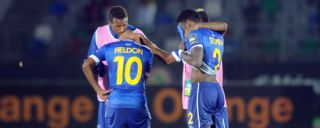|
The rise of tiny Cape Verde Islands to be named -- albeit briefly -- as the best team in Africa was truly spectacular, but equally stupefying has been their fall back to among the also-rans on the continent. The FIFA World Rankings are a quirky oddity at times, but they can be a handy guide in tracking the form of teams over a period of time. Cape Verde, having scoured Europe for players with even the remotest of links back to the islands, had built a competitive team that not only qualified for two African Nations Cup finals in a row, but also had a five-month run at the top of the African list in FIFA's rankings. They rose as high as number 27 in the world in the midst of a run of form that saw them lose just three times in 24 matches, including victories over powerhouses Ghana and Tunisia. They were well poised to qualify for the 2014 FIFA World Cup as well before the fielding on an ineligible player in an excellent 2-0 win in Tunisia that would have put them into the final round of preliminaries and two matches away from Brazil. Fernando Varela had been sent off for verbally abusing a match official in an earlier qualifier against Equatorial Guinea. He was given a four-match ban, but when Equatorial Guinea were disqualified from the competition for fielding an ineligible player of their own and the result awarded in Cape Verde's favour, the islanders assumed the red card would be declared null and void along with the result. But they assumed wrong, and it would be a costly administrative error from which the Blue Sharks have never really recovered. They qualified for the 2015 Nations Cup finals in -- ironically -- Equatorial Guinea, but drew all three of their first-round matches and were eliminated. They fell well short of topping their pool in qualification for the 2017 championship, while they have lost both of their first two games in their qualifying pool for the 2018 FIFA World Cup. Seven of their last 10 matches have ended in defeat, including their last four at home, with only victories against minnows São Tomé E Príncipe, Luxembourg and Kenya. They have been in freefall in the FIFA rankings, plunging to number 115 in the world and number 31 in Africa. That top spot on the continent, achieved not even three years ago, is now a very distant memory. Lúcio Antunes -- an air traffic controller by trade -- is back as coach of the side, having been the catalyst for their original rapid rise before leaving for Progresso do Sambizanga in Angola in 2013. But so far there has been no change in their fortunes. They started their 2019 Nations Cup qualifying campaign with a 1-0 loss to Uganda last month, and their next big assignment is a tough double-header against South Africa in the World Cup qualifiers in early September. Those two matches, in Praia on September 1 and pencilled in for Durban on September 5, will do much to determine the immediate future of the side and coach Antunes. They still have players plying their trade at a high level in Europe, like Dutch-born forward Garry Rodrigues at Galatasaray in Turkey, and Spartak Moscow forward Zé Luís. But the winning touch for the Blus Sharks is gone, and unless they can rediscover it fast, their freefall could continue, and the ability to attract those born outside of the country to play for the national team will become ever harder. From minnows to masters and back again looks a likely scenario.
|

